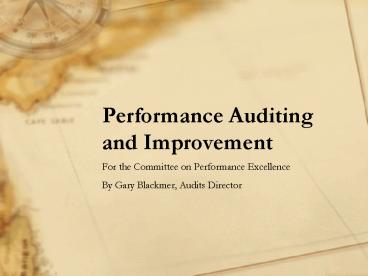Performance Auditing and Improvement - PowerPoint PPT Presentation
1 / 20
Title:
Performance Auditing and Improvement
Description:
Legislators, government officials, and the public need to know whether (1) ... by parties with responsibility to oversee or initiate corrective action, and ... – PowerPoint PPT presentation
Number of Views:29
Avg rating:3.0/5.0
Title: Performance Auditing and Improvement
1
Performance Auditing and Improvement
- For the Committee on Performance Excellence
- By Gary Blackmer, Audits Director
2
Accountability
- Legislators, government officials, and the
public need to know whether (1) government
manages public resources and uses its authority
properly and in compliance with laws and
regulations (2) government programs are
achieving their objectives and desired outcomes
(3) government services are provided effectively,
efficiently, economically, ethically, and
equitably and (4) government managers are held
accountable for their use of public resources. - Government Auditing Standards Introduction
3
Performance Auditing
- Performance audits provide objective analysis so
that management and those charged with governance
and oversight can use the information to improve
program performance and operations, reduce costs,
facilitate decision making by parties with
responsibility to oversee or initiate corrective
action, and contribute to public accountability. - Government Auditing Standards Introduction
4
Measurement in
- Performance Auditing
- Performance Measurement
- Performance Management
5
Performance Auditing
- Uses measurement to gauge problems and their
causes and impacts
6
Performance Measures
- The ongoing monitoring and reporting of program
accomplishments, particularly progress towards
pre-established goals. - Performance Measurement and Evaluation
Definitions and Relationships, GAO
7
Performance Management
- An ongoing, systematic approach to improving
results through evidence-based decision making,
continuous organizational learning, and a focus
on accountability for performance. - A Performance Management Framework for State and
Local Government, July 2009 Draft, National
Performance Management Advisory Commission
8
(No Transcript)
9
Benchmarks
- An indicator is a statistical measure that,
tracked over time, provides information on
societal conditions or trends. - The State of the USA website, www.stateoftheusa.o
rg
10
A bit of my background
- Operations analyst from 1978 to 1985
- Performance auditor since 1985
- Key participant, Multnomah County RESULTS effort
from 1996 to 1999 - Participated/Managed Portland Service Efforts and
Accomplishments 1990 and 1999 to 2009 - Initiated/Participated in Portlands Managing for
Results effort 2001 to 2009 - Administered Portland-Multnomah Progress Board
from 1996 to 2009
11
What I have learned
- Measurement systems fail because
- They cost more than the benefits produced
- They are used to punish, or reward
- They have no leadership support, any longer
- They become more important than management
practices - They dont live up to expectations
12
What I have learned
- Measurement systems succeed because they
- Inform managers, policy-makers, and the public
- Enrich discussions during decision-making
- Solve problems
- Improve efficiency and effectiveness
- Improve accountability
13
How I apply that learning
- The value of a measurement system must exceed
its costs
14
- Focusing on the measures pushes up the cost side
of the equation, and doesnt necessarily increase
benefits. By pulling on the benefits side of the
equation using the measures in management
decision-making we will create demand for good
measures. If we build expectations for
performance management, then measures will
follow.
15
Our audits will support performance management in
these ways
- Use KPMs and benchmarks to help select audit
areas - Focus our efforts on aspects that directly
improve agency outcomes, which should improve
KPMs and benchmarks - Develop selected diagnostic measures that track
key agency internal problems/solutions - Assess KPM reliability and relevance when related
to our audit scope - Craft our recommendations in a performance
management context - Recommend Lean-type solutions when we see
significant opportunities for streamlining
16
- Weaknesses in planning and budgeting
17
In order to improve the Police Bureaus ability
to estimate resource needs and deploy resources
effectively, management should
- Develop a comprehensive set of goals, objectives
and performance measures for the investigations
function. - Develop a staffing model that incorporates goals,
objectives, and detective productivity data. - Strengthen Detective Division case management
controls by adopting a more detailed set of
supervisory oversight and assignment procedures.
18
- Weaknesses in planning, managing and evaluating
19
PDOT needs to take additional action to ensure
that its in-house paving projects produce
acceptable pavement quality. To help achieve high
pavement quality and reduce future maintenance
costs, we recommend that the Street Preservation
Program
- Develop clear and complete specifications for the
desired quality of asphalt mix. - Prepare and follow a pavement quality assurance
plan that outlines procedures and individual
responsibilities for monitoring asphalt quality
and taking remedial action when asphalt is found
to be substandard. - Increase in-house technical expertise on pavement
design and quality provide more training of
Street Preservation personnel and include
pavement quality in performance measures and
employee evaluations.
20
Questions Comments































